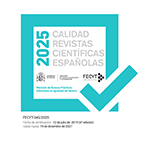The pontifical absolutism of the 15th century in two opuscules by Rodrigo Sánchez de Arévalo
Abstract
Rodrigo Sánchez de Arévalo, who was originally a strong conciliarist, became later a fervent advocate of the Pope. Two of his works offer a remarkable development of his ideas: De libera et irrefragabili auctoritate Romani Pontificis (1464/1465) and De sceleribus Turchi (1467). The main focus for Arévalo is the divine origin of power, based on the figure of Saint Paul and the titles of vicarius Christi and princeps. The papal potestas has two essential features: it is total and limitless. Arévalo uses the Aristotelian concept of epiqueya with the purpose of supporting the completely free exercise of papal power. Arévalo reflects on the relationship between the Pope and the college of cardinals, whose faculty is limited to the election of the pope as a person. They are subject to the Pope in terms of obedience. Arévalo adopts an organic analogy of the body politics in which the Pope is the head of the mystic body of the Church.
Downloads
Article download
License
In order to support the global exchange of knowledge, the journal En la España Medieval is allowing unrestricted access to its content as from its publication in this electronic edition, and as such it is an open-access journal. The originals published in this journal are the property of the Complutense University of Madrid and any reproduction thereof in full or in part must cite the source. All content is distributed under a Creative Commons Attribution 4.0 use and distribution licence (CC BY 4.0). This circumstance must be expressly stated in these terms where necessary. You can view the summary and the complete legal text of the licence.
En la España Medieval is an open access journal that does not charge authors for article processing (submission, review or editing) or publication.












